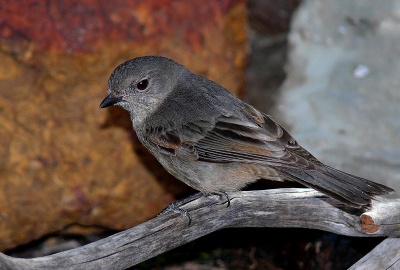m (format) |
|||
| Line 1: | Line 1: | ||
| − | [[Image:Gilberts_Whistler_male_by_Greg_McKay.jpg|thumb|500px|right|Male<br />Photo by {{user| | + | [[Image:Gilberts_Whistler_male_by_Greg_McKay.jpg|thumb|500px|right|Male<br />Photo by {{user|Greg+McKay|Greg McKay}}<br /> Terrick terrick N.P [[Victoria]], [[Australia]], November 2009 ]] |
'''Alternative names: Black-lored Whistler; Red-throated Whistler; Red-throated Thickbird''' | '''Alternative names: Black-lored Whistler; Red-throated Whistler; Red-throated Thickbird''' | ||
;[[: Category:Pachycephala|Pachycephala]] inornata | ;[[: Category:Pachycephala|Pachycephala]] inornata | ||
Revision as of 07:42, 11 November 2009
Alternative names: Black-lored Whistler; Red-throated Whistler; Red-throated Thickbird
- Pachycephala inornata
Identification
17 - 20.5cm
- Brownish-grey upperparts (individual variation in colours in general)
- Black lores and red eye
- Deep orange upper breast and throat
- Pale grey rest of breast and abdomen
- Buff-white undertail-coverts
Females are uniform grey above and lighter grey below with a darker breast. Juveniles have a rufous-brown breast and upperparts.
Similar species
Similar to Red-lored Whistler but note dark lores and missing orange abdomen.
Distribution
Southern parts of Australia.
Generally uncommon.
Taxonomy
Some sources recognize two subspecies (inornata and gilbertii), others think this is a monotypic species.
Sometimes placed in genus Timixos.
Habitat
Shrubby woodland and mallee.
Behaviour
Feeds mainly on insects, takes sometimes fruits and seeds.
Forages on or close to the ground. Beautiful song but very difficult to get close to.
Breeding season from July to December. The nest is a deep cup made of dry grass, fine twigs and bark stripes. It's placed 0.4 - 6m above the ground in an upright fork of a small tree or shrub. Lays 2 -3 eggs.
Nomadic in some places, but movements poorly understood.
References
- Clements, JF. 2008. The Clements Checklist of Birds of the World. 6th ed., with updates to December 2008. Ithaca: Cornell Univ. Press. ISBN 978-0801445019.
- Simpson, K and N Day. 1998. Field Guide to the Birds of Australia. London: Christopher Helm. ISBN 0-7136-4877-5
- Del Hoyo, J, A Elliott, and D Christie, eds. 2007. Handbook of the Birds of the World. Volume 12: Picathartes to Tits and Chickadees. Barcelona: Lynx Edicions. ISBN 978-8496553422
- Pizzey, G. & Knight, F. 1997. Birds of Australia (Collins Field Guide). HarperCollins Publishers, London. ISBN 0-00-220132-1
- BF member personal observation
Recommended Citation
- BirdForum Opus contributors. (2024) Gilbert's Whistler. In: BirdForum, the forum for wild birds and birding. Retrieved 6 May 2024 from https://www.birdforum.net/opus/Gilbert%27s_Whistler





